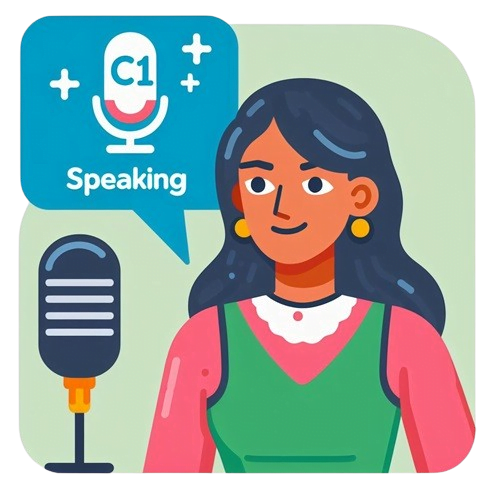Cambridge C1 (CAE): Guide to Speaking Part 1

Key Takeaways
- Respond as spontaneously as possible.
- Speak naturally at normal pace. Do not speak fast and make sure you are not speaking slowly.
- Do not use memorized phrases. Rehearsed speeches should be avoided as these are easily spotted and they might be inappropriate for the questions asked.
- Don’t think about the question and do not pause to plan your answers.
What you will find in this guide:
Cambridge C1 (CAE) Speaking Part 1
The Speaking test contains four parts. There are always two examiners, one is called the interlocutor, and the other is called the examiner. You will only speak with the interlocutor and the examiner will only observe you. The interlocutor manages the interaction either by asking questions or providing cues for the candidates. The examiner does not join the conversation.
Part one takes around 1 to 2 minutes (3 minutes for groups of three). There will be a short conversation between the interlocutor and each candidate where the interlocutor asks questions about general topics. Part 1 gives candidates the opportunity to show their ability to use general social and interactional language and talk about themselves, their interests, experiences, plans for the future, etc. The interlocutor asks candidates for some information about themselves, then widens the scope of the questions by asking about, e.g. candidates’ leisure activities, studies, travel and holiday experiences, and daily life. Candidates are expected to respond to the interlocutor’s questions, and to listen to what their partner has to say.
Sample Question
To gain a better understanding of how speaking part 1 in Cambridge C1 (CAE) is, you can take a look at this real C1 exam interview from Cambridge. You can watch only part 1 or the whole speaking exam if you so wish to.
Examiner's Comments
The Rubric
Guide to Part 1
Part 1 is pretty straightforward. The whole purpose of part 1 is to help you relieve stress and get you ready for the next parts. So, please do the following:
- Respond promptly with answers which are as complete (not just one word) and as spontaneous as possible.
- Speak naturally at normal pace. Do not speak fast and make sure you are not speaking slowly. Sometimes, candidate get stressed out and speak faster or slower than they usually do as a result of their stress. Make sure this wouldn’t happen to you.
- Do not use memorized phrases. Rehearsed speeches should be avoided as these are easily spotted and they might be inappropriate for the questions asked.
- Don’t think about the question and do not pause to plan your answers. ‘think on your feet’ and answer a question quickly, even if you have never thought about a particular subject before.
- Try and use a variety of appropriate tenses, structures and vocabulary in this part of the test. This will create a good impression and give you confidence to tackle the other parts of the test.
- Try to show normal but interactive body language and facial expressions. Remember that facial expressions and your body language can improve the first impression you are making.
- Try to make your responses interactive and relevant to the whole conversation. If you are asked about your hobbies, and your partner has already given his/her answer, try saying: Unlike David (your partner) I like to go to the gym every day. This way you can make sure your responses are relevant to the bigger context of the whole discussion.
Use the Guide
Use the guide above to practice answering sample questions of C1 Advacned (CAE) speaking part 1. By practicing with sample questions and using the expert tips provided in the guide, you can make sure you are ready for the speaking part 1 in a very short time, and that you an ace this part of the test.
Sample Questions
The following are sample Cambridge C1 part 1 speaking questions. You can practice your speaking skill by answering these questions. If you want to get a complete list of sample Cambridge sample speaking questions, you can click here!
Family and Friends
- How important do you think family is? … (Why?)
- How much time do you spend with your family and what do you enjoy doing with them?
- What qualities does a close friend need to possess?
- With whom would you discuss a difficult personal situation, a family member or a close friend? … (Why?)
Art
- What would you say your relationship with the arts is?
- Which kind of art are you most interested in? (Why?)
- When was the last time you visited a museum, gallery or exhibition? What were your impressions on this visit?
- Who is your favourite artist? … (Why?)
Travel
- Who do you prefer to travel with? .. (Why?)
- Are you more fond of long or short distance travel?
- What has been your most exciting travel experience thus far?
- Name some things that you would never leave behind you when you travel.
Sports
- Do you prefer team sports or individual sports?
- What qualities do you need to possess in order to do well in a team sport?
- What do you think about extreme sports?
- What are the most popular sports in your country?
Celebrities
- What are some of the advantages and disadvantages of being famous?
- Who is your favourite celebrity? .. . (Why?)
- What would you be willing to sacrifice in order to be famous?
- Why do you think more and more young people nowadays long for fame and money?
Sport and leisure
- How often do you get around to working out?
- What are the pros and cons of doing physical activity?
- Have you ever had an amazing sporting experience?
- Are there any times that you would rather relax to unwind from the stress of your routine rather than be active?
- What has been your greatest sporting achievement?
Success and failure
- What would you consider to be your greatest achievement?
- What is success? Define it.
- Is money an essential part of success nowadays?
- Can massive failures ever contribute towards a person’s success?
- Have you ever failed miserably at something?
Communication
- How has the internet changed the way we communicate?
- What negative effects has the internet had on our social lives?
- Are you keen on talking on the phone? Why (not)?
- When was the last time you sent a personal letter?
- Which forms of communication will become obsolete?
Health
- How important is our diet in living a healthy life?
- Would you ever consider having cosmetic surgery?
- Do you visit the doctor as often as you should?
- Are people aware of the dangers of cigarettes and alcohol?
- What is the best way of preventing or dealing with drug addiction?
Crime
- Do you know anyone who has been a victim of crime?
- Should any illegal substances such as cocaine be legalized?
- What is the most serious crime one can commit?
- What can we do to ensure that youngsters don’t get involved in criminal behaviour?
- What is the most common crime in your region?
Speaking Checklist
Use a checklist to track your performance. Download the checklist here and evaluate your speaking.
How was your experience?
How was your experience taking speaking part 1? Describe your experience in the comment section below. Also, if you are interested to read about part 2 of the speaking paper, you can read my comprehensive guide to part 2 here.






